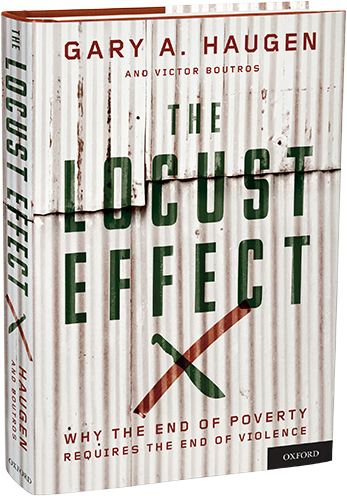The Locust Effect
In this game-changing new book, Gary Haugen of International Justice Mission and Victor Boutros of the U.S. Department of Justice argue that the experience of being poor nearly always includes vulnerability to violence, and that this violence keeps the cycle of poverty exceedingly difficult to break. They write, “It turns out that you can provide all manner of goods and services to the poor, as good people have been doing for decades, but if you are not restraining the bullies in the community from violence and theft—as we have been failing to do for decades—then we are going to find the outcomes of our efforts quite disappointing.”
This book doesn’t make for easy bedtime reading. No one who reads it will forget the story of Yuri, an 8-year-old victim of rape and murder in a remote Peruvian village, or the countless other stories of violent crime committed against people living in poverty throughout the world. Moreover, while the authors’ thorough documentation of studies related to violence and poverty will give the book credence among those whose decisions can truly affect the lives of billions, this intellectual seriousness doesn’t make for a carefree joyride.
Indeed, until the final chapter or two, we find ourselves faced with heartbreaking stories of violent abuse and explanations of the dizzyingly complex nature of the problem of lawless violence. Haugen and Boutros, it seems, are realists, but they are realists of the hopeful sort.
While some books about ending poverty make convenient and all-too-predictable “silver bullet” cases for a particular type of intervention, Haugen and Boutros manage to avoid that trap. Rather than diminishing the importance of traditional approaches to development, they say such efforts should be redoubled. The authors’ aim, however, is “to make sure that we are safeguarding the fruits of those efforts from being laid waste by the locusts of predatory violence.” Making a forceful and convincing case for one thing does not require pretending that nothing else matters; others who write about poverty and development should take note.
The Locust Effect, published by the prestigious Oxford University Press, is not an overtly Christian book. Nonetheless, anyone familiar with the work of Haugen and his IJM colleagues knows they are unquestionably motivated by deep Christian faith. Further, it seems to me that this book outlines a distinctly Christian way of doing human rights work, however subtly it is presented. Whereas activists often pit themselves antagonistically against corrupt systems and public figures, Haugen and Boutros call for a different approach. They recognize the corruption for what it is, to be sure, but they also understand that true flourishing requires the transformation of unjust systems and people—not the eradication of them.
Therefore, IJM isn’t content to shame corrupt or inadequate governments and law enforcement personnel into changing their ways. Rather, the goal is to establish trust and ideally to one day become authentic partners in defending the vulnerable and ensuring justice for all. “This can be a longer process than the approach of the dramatic, damning exposé,” they write, “but the truth is, it’s simply naïve to believe that meaningful transformation of a dysfunctional criminal justice system can ever occur without champions taking up the fight from the inside.”
With great moral urgency, The Locust Effect issues a clarion call to courageous action on behalf of the vulnerable poor. The sobering news is that the plague of hidden, everyday violence is real. The good news is that it is not inevitable.
This review originally appeared in PRISM, published by Christians for Social Action.
